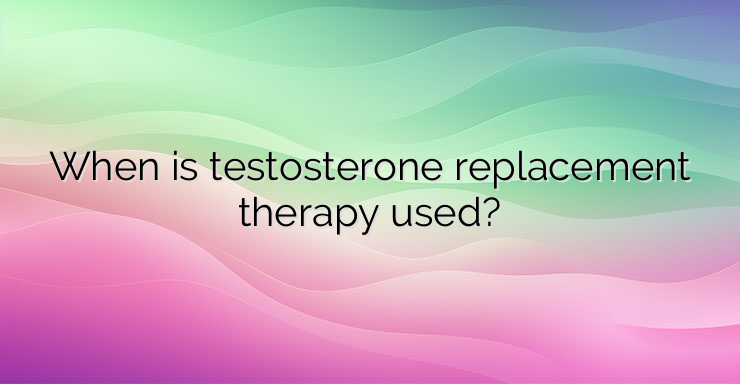What is testosterone? Testosterone is a hormone that is mainly produced in the testicles and in men it helps with: Bone density; Fat distribution; Muscle strength and mass; Facial and body hair; Production of red blood cells; Libido; Semen production What happens to testosterone levels as men age? Testosterone levels typically peak during adolescence and early adulthood. As you age, your testosterone level gradually declines�usually about 1% per year after age 30 or 40. For older men, it is important to determine whether low testosterone is due to normal aging or is due to disease (hypogonadism). Hypogonadism (a condition in which the body does not synthesize enough testosterone in men) prevents the ability to produce normal amounts of testosterone due to a problem with the testicles or the pituitary gland, which controls the testicles. Testosterone replacement therapy in the form of injections, pellets, patches, or gels can improve the signs and symptoms of low testosterone in these men. Does declining testosterone cause the signs and symptoms of aging in men? A naturally declining testosterone level does not necessarily cause the signs and symptoms of aging. Some age-related problems in men can occur as a result of lower testosterone levels, these include: Changes in sexual function. This can include decreased sex drive, fewer spontaneous erections (such as during sleep) and infertility; Physical changes. A variety of physical changes are possible, including increased body fat, decreased muscle volume and strength, and decreased bone density. Swollen or tender breasts (gynaecomastia) and reduced body hair are possible. A man may have less energy than before; Emotional changes. Low testosterone levels can contribute to decreased motivation or self-esteem. The affected man may feel sad or depressed, or have problems concentrating or remembering; Some of these signs and symptoms can be caused by other factors, including medication side effects, obstructive sleep apnea, thyroid problems, diabetes, and depression. It’s also possible that these conditions cause low testosterone levels, so treatment can lead to an increase in testosterone levels. What are the effects of testosterone therapy? Testosterone therapy may sound promising, yet there are many misconceptions about what the treatment can and cannot do. Testosterone therapy may seem like the ultimate anti-aging formula for men. Yet the health benefits of testosterone therapy for age-related testosterone decline are unclear.Testosterone replacement therapy is indicated for severe hypogonadism. However, the indication for testosterone therapy in adult men with hypogonadism without hypothalamic, pituitary, or testicular disease is debated. In aging men, low testosterone is associated with abdominal obesity, sarcopenia, and indices of insulin resistance. It is not clear whether low testosterone levels are a cause or a consequence of obesity and insulin resistance. In severe hypogonadism, such as idiopathic hypogonadotropic hypogonadism, testosterone therapy improves insulin sensitivity (related to the body’s ability to regulate blood sugar levels by releasing insulin). Theoretically, testosterone may have the potential to improve or worsen insulin sensitivity. On the one hand, testosterone can improve insulin sensitivity by increasing lean body mass (LBM, lean body mass without subcutaneous fat) and thus muscle mass. On the other hand, the testosterone-induced change in lipid metabolism may reduce insulin sensitivity. References: 1. National Center for Biotechnology Information. Testosterone therapy increased muscle mass and lipid oxidation in aging men 2. Mayo Clinic. Testosterone therapy: Potential benefits and risks as you age 3. Bhasin S, Cunningham GR, Hayes FJ, Matsumoto AM, Snyder PJ, Swerdloff RS, Montori VM. Testosterone therapy in men with androgen deficiency syndromes: an Endocrine Society clinical practice guidelinean Endocrine Society clinical practice guidelinean Endocrine Society clinical practice guideline


Leave a Reply